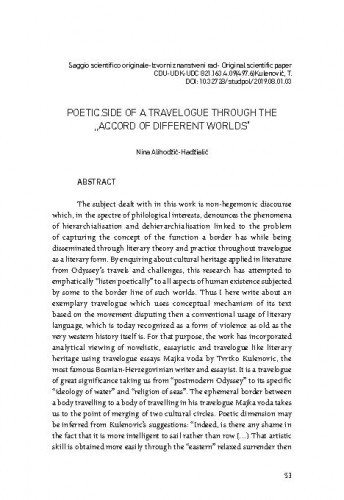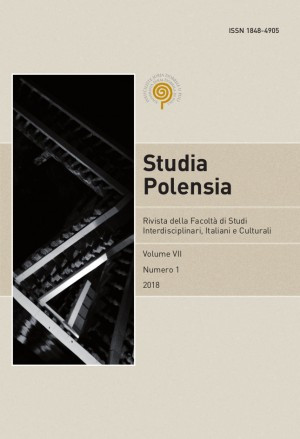The subject dealt with in this work is non-hegemonic discourse which, in the spectre of philological interests, denounces the phenomena of hierarchialisation and dehierarchialisation linked to the problem of capturing the concept of the function a border has while being disseminated through literary theory and practice throughout travelogue as a literary form. By enquiring about cultural heritage applied in literature from Odyssey’s travels and challenges, this research has attempted to emphatically “listen poetically” to all aspects of human existence subjected by some to the border line of such worlds. Thus I here write about an exemplary travelogue which uses conceptual mechanism of its text based on the movement disputing then a conventional usage of literary language, which is today recognized as a form of violence as old as the very western history itself is. For that purpose, the work has incorporated analytical viewing of novelistic, essayistic and travelogue like literary heritage using travelogue essays Majka voda by Tvrtko Kulenovic, the most famous Bosnian-Herzegovinian writer and essayist. It is a travelogue of great significance taking us from “postmodern Odyssey” to its specific “ideology of water” and “religion of seas”. The ephemeral border between a body travelling to a body of travelling in his travelogue Majka voda takes us to the point of merging of two cultural circles. Poetic dimension may be inferred from Kulenovic’s suggestions: “Indeed, is there any shame in the fact that it is more intelligent to sail rather than row (...) That artistic skill is obtained more easily through the “eastern” relaxed surrender then through the “western” intent and concentration (attempt to forcibly control mind equals the attempt to even out the waves of the sea). Who hits the target, misses all? (...) We must be capable of changing our shape as water does. (...) In the beginning there was no word, but water.
Sažetak

 Studia Polensia : rivista del Dipartimento di studia in lingua italiana : 8,1(2019) / capo redattore Eliana Moscarda Mirković.
Studia Polensia : rivista del Dipartimento di studia in lingua italiana : 8,1(2019) / capo redattore Eliana Moscarda Mirković.